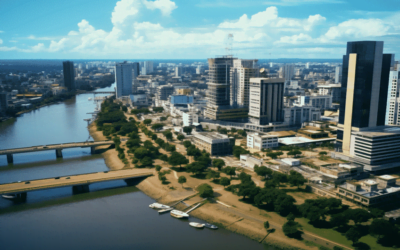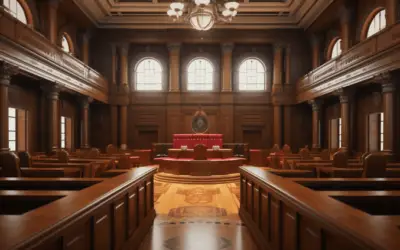Hey there, fellow drone enthusiasts! I can understand that you’ve probably found your way here because you’re as excited about flying your drone in Saint Vincent and the Grenadines as I am.
Drones open up a world of possibilities, from capturing stunning aerial shots to exploring the beautiful landscapes of this Caribbean gem. But before we take to the skies, you might be wondering about the drone laws and regulations that govern our airborne adventures. Well, I’ve got you covered.
You see, I’ve delved deep into the realm of Saint Vincent and the Grenadines drone laws, so you don’t have to. I’ve scoured official documents, reached out to local authorities, and kept my ears to the ground within the drone community.
The result? A comprehensive guide that’ll answer all your questions about flying drones in this picturesque island nation.
So, if you’re eager to soar the skies with your trusty drone but want to do so while respecting the laws and regulations in place, you’re in the right place. I’ve got all the insights you need to navigate the drone regulations of Saint Vincent and the Grenadines.
Just keep reading, and I’ll walk you through the dos and don’ts, the permits, the no-fly zones, and everything in between. It’s time to turn your drone flights into memorable and legal adventures. Let’s get started!
- General Regulations
- Safety and Privacy Concerns
- Commercial Drone Operations
- Penalties and Enforcement
- Future Developments and Technological Advancements
- Future Developments and Technological Advancements
- Final Thoughts on Saint Vincent and the Grenadines Drone Laws
- Frequently Asked Questions About Saint Vincent and the Grenadines Drone Laws
General Regulations

Hey there, fellow drone enthusiasts! In this section, we’ll dive into the nitty-gritty of Saint Vincent and the Grenadines’ drone laws. General regulations are the foundation upon which responsible and enjoyable drone flights are built. Let’s explore what you need to know.
Registration Requirements
When it comes to flying a drone in Saint Vincent and the Grenadines, one of the first things you’ll want to consider is whether your drone needs to be registered. Drone registration is a fundamental step in ensuring the responsible operation of unmanned aerial systems.
1. Drone Registration Process
Registering your drone is a simple, yet crucial, process. It’s essential to stay compliant with the law and maintain a record of your drone’s ownership. Local aviation authorities typically oversee this process, and you’ll be required to provide details about your drone, such as its make and model, serial number, and contact information.
But here’s the catch: regulations can evolve, and requirements may change, so it’s vital to check with the local aviation authority for the most up-to-date information on the drone registration process.
Trust me; it’s a small but essential step in ensuring your drone adventures are legal and hassle-free.
2. Fees and Documentation
The drone registration process might involve some fees. These fees can vary, depending on the specifics of your drone and the local regulations. However, it’s a small price to pay for peace of mind, knowing you’re following the rules.
Additionally, you’ll need to keep documentation of your registration readily available during your drone flights, as authorities may request it if necessary.
Drone Operator Permit
Now, let’s talk about obtaining a drone operator permit, also known as a license. This permit is often required to operate drones for various purposes, including recreational and commercial uses.
1. Obtaining a Permit/License
To obtain a drone operator permit, you’ll need to go through an application process, which typically involves demonstrating your knowledge of drone operation and relevant regulations. This may include passing a written exam or participating in a training program.
Here’s the scoop: having a drone operator permit is like having a driver’s license for your drone. It’s a sign that you’re well-prepared to operate a drone safely and responsibly, and it’s your ticket to incredible aerial experiences in Saint Vincent and the Grenadines.
2. Application Process and Criteria
The specific criteria and application process for obtaining a drone operator permit can vary. It’s essential to research and stay updated with the latest requirements.
Authorities might assess factors like your knowledge of aviation rules, your ability to operate the drone safely, and your commitment to respecting privacy and safety concerns.
In the end, this permit ensures that drone operators are aware of their responsibilities, promoting a safer and more enjoyable environment for everyone who shares the skies.
Stay tuned as we continue our journey into the drone regulations of Saint Vincent and the Grenadines. We’ll be uncovering more details about restricted and no-fly zones, as well as the altitude limits to keep your drone flights not only exhilarating but also compliant with the law.
Also Read: Saint Lucia Drone Laws
Safety and Privacy Concerns

Ensuring safety and respecting privacy are paramount when operating drones in Saint Vincent and the Grenadines. In this section, we’ll delve into the privacy regulations and safety guidelines you need to be aware of to fly responsibly.
Privacy Regulations
Privacy is a fundamental consideration when flying drones. To maintain a harmonious coexistence with the local community, understanding and complying with privacy regulations is a must.
1. Respecting Individuals’ Privacy
Respecting individuals’ privacy is a golden rule for drone operators. Just as you wouldn’t want someone flying a drone near your private property without permission, others expect the same courtesy.
Keep a respectful distance from people’s homes, backyards, and private spaces. It’s a matter of common decency that not only ensures you’re on the right side of the law but also maintains positive community relations.
2. Privacy Laws Related to Drone Usage
Saint Vincent and the Grenadines, like many countries, may have specific privacy laws pertaining to drone usage. These laws might touch on issues like capturing images or videos of people without their consent.
To avoid any legal entanglements, it’s wise to acquaint yourself with the relevant privacy regulations. Ignorance is not a valid excuse, and responsible drone operators prioritize understanding and adhering to these laws.
Safety Guidelines
Safety isn’t just a matter of rules and regulations; it’s about protecting people and property while having a fantastic drone experience. Let’s explore the safety guidelines that help ensure your flights are enjoyable and hazard-free.
1. Avoiding Endangerment of People and Property
When operating a drone, safety comes first. Always maintain a safe distance from people, animals, and property. The last thing you want is an accident or damage caused by your drone. Responsible drone pilots make safety a priority, ensuring that their flights do not pose any danger to others.
2. Adhering to Safety Protocols and Best Practices
Saint Vincent and the Grenadines’ authorities often recommend adhering to safety protocols and best practices for drone operation. This may include maintaining a line of sight with your drone, flying in daylight hours, and avoiding flights near busy roads or crowded areas. Staying informed about these guidelines and incorporating them into your drone flights guarantees a safer and more enjoyable experience.
Remember, it’s not just about legal compliance but also about preserving the reputation of drone enthusiasts and ensuring that we can continue to explore the skies in harmony with the environment and our fellow citizens. Now, let’s move on to the next point: commercial drone operations.
Also Read: Saint Kitts and Nevis Drone laws
Commercial Drone Operations

Commercial drone operations open up a world of opportunities, from aerial photography to surveying and more. However, it’s crucial to understand the regulations and requirements that come with this aspect of drone use in Saint Vincent and the Grenadines.
Licensing and Training Requirements
If you’re considering using your drone for commercial purposes, you’ll need to dive into licensing and training requirements to ensure you’re operating legally and safely.
1. Commercial Pilot License for Drones
Operating drones for commercial purposes typically requires obtaining a commercial pilot license for drones. This process ensures that you’re adequately trained and knowledgeable about the regulations specific to commercial drone use. It often involves passing a written exam and, in some cases, a practical flight test.
Getting a commercial pilot license is akin to receiving a seal of approval, indicating that you possess the skills and expertise necessary to operate drones commercially. It’s your ticket to turning your drone hobby into a profitable venture.
2. Training Programs and Accreditation
To prepare for the commercial pilot license, you may need to undergo training through accredited programs.
These programs provide in-depth education on drone operation, regulations, safety procedures, and more. Completing such training equips you with the knowledge and skills to operate drones professionally and legally.
Choosing a reputable and accredited training program is essential for ensuring that you receive quality education and guidance. Remember, safety and proficiency are the cornerstones of successful commercial drone operations.
Insurance Requirements
Commercial drone operators in Saint Vincent and the Grenadines are often required to have liability insurance. This insurance provides coverage in case of accidents or damage caused during commercial drone operations.
1. Liability Insurance for Commercial Drone Operators
Liability insurance is a safety net for both the operator and the public. It ensures that in the event of an accident or property damage caused by your drone, there’s financial protection in place. This coverage is not only a legal requirement but also a responsible step to take when conducting commercial drone operations.
2. Importance of Insurance Coverage
Having liability insurance demonstrates your commitment to responsible drone operations. It’s an essential component of maintaining trust with clients and protecting your own interests. Accidents can happen, and having proper insurance coverage ensures that you’re prepared for unexpected situations.
So, if you’re considering venturing into the world of commercial drone operations in Saint Vincent and the Grenadines, remember to get the necessary training, obtain the required license, and don’t forget about the importance of liability insurance coverage.
These steps not only keep you on the right side of the law but also enable you to offer your services confidently and professionally.
Also Read: Rwanda Drone Laws
Penalties and Enforcement

Understanding the penalties and enforcement mechanisms related to drone regulations in Saint Vincent and the Grenadines is essential for every responsible drone operator. In this section, we’ll explore the consequences of violating these rules and how authorities ensure compliance.
Penalties for Violating Drone Regulations
Let’s face it; mistakes can happen even to the most diligent drone pilots. However, it’s crucial to be aware of the potential penalties and legal consequences when these mistakes lead to violations of drone regulations.
1. Fines and Legal Consequences
Violating drone regulations can lead to fines and other legal consequences. The severity of the penalties may depend on the nature and extent of the violation.
These fines can range from relatively minor penalties for minor infractions to more significant fines and even legal action for more severe breaches of the law. By adhering to the rules, you can avoid these potential financial and legal pitfalls.
2. Impact on Drone Operators’ Records
In addition to immediate penalties, violations of drone regulations can have long-term consequences. Such violations may result in records being kept by the authorities, potentially affecting your standing as a responsible drone operator.
Your record could be accessed in the future, potentially impacting your ability to obtain licenses or permits or affecting your reputation in the drone community.
B. Enforcement Procedures
Saint Vincent and the Grenadines’ authorities take drone regulations seriously and have specific procedures in place to enforce these rules.
1. Monitoring and Surveillance
Monitoring and surveillance are tools used by the authorities to ensure compliance with drone regulations. These measures might include tracking and identifying drones in operation and monitoring the behavior of operators. Advanced technology allows for the effective monitoring of airspace to prevent unauthorized or unsafe drone flights.
2. Reporting Violations and Whistleblower Protection
The public plays a vital role in enforcing drone regulations. Authorities encourage individuals to report violations, ensuring that the community remains actively involved in maintaining safety and security.
Whistleblower protection is in place to safeguard those who report violations, allowing for the responsible policing of drone operations.
It’s important to understand that the enforcement of drone regulations serves not only to penalize wrongdoers but also to create a safe environment for all drone enthusiasts.
By following the rules and respecting the law, you can help maintain the integrity and reputation of the drone community in Saint Vincent and the Grenadines. Now, let’s continue our exploration by moving on to the next section.
Also Read: Russia Drone Laws
Future Developments and Technological Advancements

The world of drones is continuously evolving, and Saint Vincent and the Grenadines is no exception. In this section, we’ll take a look at the potential changes in drone laws and the influence of technological advancements on these regulations.
We’ll also explore international collaboration efforts that could shape the future of drone operations.
Potential Changes in Drone Laws
As technology advances, so do the regulations governing drone operations. Keeping an eye on potential changes is essential for staying compliant and informed about what lies ahead.
1. Anticipated Regulatory Updates
Saint Vincent and the Grenadines, like many countries, periodically reviews and updates its drone laws. These changes often aim to accommodate new technologies, address safety concerns, and align with international standards.
Drone enthusiasts should stay vigilant and be prepared for potential changes in regulations, which may impact how they operate their drones.
2. Influence of Technological Advancements on Regulations
Technological advancements have a significant influence on drone regulations. New features, such as geofencing and obstacle avoidance systems, are shaping the way drones operate safely.
Regulations may adapt to incorporate these innovations and ensure a higher level of safety and security for all.
International Collaboration
The world is becoming increasingly interconnected, and this applies to drone regulations as well. International collaboration is on the horizon and has the potential to harmonize drone regulations globally.
1. Cooperation with International Aviation Authorities
Saint Vincent and the Grenadines is actively involved in cooperation with international aviation authorities to ensure a unified approach to drone regulations. This collaboration can lead to the sharing of best practices, standardized regulations, and improved communication among countries to facilitate safe drone operations.
2. Harmonization of Drone Regulations on a Global Scale
The harmonization of drone regulations on a global scale is a promising development for drone enthusiasts. It means that as a drone operator, you could potentially navigate international regulations more easily, fostering the growth of cross-border drone activities.
As the future of drone laws and technology continues to unfold, staying informed about potential changes and international collaboration efforts is vital.
By embracing these developments, drone operators can look forward to a world of exciting opportunities while ensuring safe and responsible drone operations. Now, let’s wrap up this article with some final thoughts.
Also Read: Romania Drone Laws
Future Developments and Technological Advancements

Hello there, fellow drone enthusiasts! In this section, we’re going to take a look into the crystal ball and explore what the future holds for drone laws in Saint Vincent and the Grenadines.
Brace yourselves for some exciting potential changes and international collaboration that could shape the drone landscape.
Potential Changes in Drone Laws
The world of drones is in a state of constant flux. As technology evolves, so do the rules and regulations that govern it. Let’s delve into what potential changes might be on the horizon.
1. Anticipated Regulatory Updates
Keep your eyes on the horizon because drone laws are subject to updates and revisions. Saint Vincent and the Grenadines, like many other countries, periodically reviews its drone regulations. These updates are often designed to keep pace with technological advancements and to address new safety concerns that may arise.
As a drone enthusiast, it’s essential to stay informed about any potential regulatory changes. Anticipated updates could influence how you fly your drone, affecting everything from flight altitudes to privacy rules. Being in the know ensures that you remain a responsible and law-abiding pilot.
2. Influence of Technological Advancements on Regulations
As drones become more technologically advanced, they offer new opportunities and challenges. Innovations like geofencing and obstacle avoidance systems are revolutionizing how drones operate safely.
These advancements have the potential to shape and refine regulations, with an emphasis on enhancing safety and security for all.
The influence of technology on regulations means that, as a drone pilot, you may find yourself navigating a dynamic landscape. But don’t worry, these technological developments are opening up exciting possibilities, and with careful adherence to new rules, the skies remain full of adventure.
B. International Collaboration
In a world that’s increasingly connected, international collaboration on drone regulations is a beacon of hope for the future. Let’s explore how working together on a global scale can make drone operations even more thrilling.
1. Cooperation with International Aviation Authorities
Saint Vincent and the Grenadines recognizes the importance of cooperating with international aviation authorities.
This collaboration aims to create a unified approach to drone regulations, where best practices are shared, and standardized rules become the norm. This cooperation paves the way for smoother cross-border drone activities.
When countries collaborate, it fosters a sense of shared responsibility for drone safety. This not only benefits the global drone community but also enables you to take your drone on international adventures with greater ease.
2. Harmonization of Drone Regulations on a Global Scale
Imagine a world where drone regulations are harmonized on a global scale. This means that whether you’re flying your drone in Saint Vincent and the Grenadines or any other part of the world, you’ll encounter consistent and easily navigable rules. It’s a bright future that can facilitate international drone exploration and collaboration.
Global harmonization of drone regulations signals an exciting era for drone enthusiasts. It promises a world where operating a drone is seamless, and where the love for flying knows no geographical bounds.
As we conclude our exploration of Saint Vincent and the Grenadines’ drone laws, it’s evident that the future holds promise and potential.
Embracing these changes, staying informed, and engaging in responsible drone operations ensures a safe, exciting, and harmonious experience for all. So, whether you’re a novice pilot or a seasoned pro, keep soaring to new heights with your trusty drone!
Also Read: Qatar Drone Laws
Final Thoughts on Saint Vincent and the Grenadines Drone Laws

As our journey through the skies of Saint Vincent and the Grenadines comes to a close, it’s time to reflect on the key takeaways from our exploration of drone laws and regulations. Let’s wrap things up with some final thoughts and encouragement for responsible drone usage.
Saint Vincent and the Grenadines’ drone laws are not merely a set of rules but a roadmap to safe, enjoyable, and responsible drone flights. These regulations serve as the foundation for drone enthusiasts to embark on adventures that capture the beauty of this Caribbean nation.
Adhering to drone laws is not just a legal obligation; it’s a moral one. Respecting the privacy and safety of individuals, avoiding the endangerment of people and property, and obtaining the necessary permits and licenses are all part of being a responsible drone operator.
Compliance ensures that the drone community can thrive, making the skies a welcoming place for all.
As an enthusiast, I encourage you to embrace responsible drone usage. Whether you’re flying for recreational purposes or venturing into the realm of commercial operations, prioritize safety, abide by regulations, and respect the rights and privacy of others. Together, we can continue to enjoy the incredible experiences that drones offer.
The future of drone regulations in Saint Vincent and the Grenadines is filled with potential. Anticipated regulatory updates, technological advancements, and international collaboration promise a dynamic landscape for drone enthusiasts.
Embrace these changes, stay informed, and remember that the skies are a boundless canvas for you to paint your aerial dreams.
So, fellow drone pilots, as you take flight in this island paradise, remember to soar with responsibility, respect, and a sense of wonder.
Your drone adventures can be as limitless as the open sky itself, and your responsible usage ensures that the beauty and harmony of Saint Vincent and the Grenadines remain untouched by the wings of technology.
Safe flying, and may your drone journeys be filled with awe and inspiration!
Frequently Asked Questions About Saint Vincent and the Grenadines Drone Laws
Do I need to register my drone in Saint Vincent and the Grenadines?
Yes, drone registration is a crucial step to ensure responsible drone usage. To maintain compliance with the law, you must register your drone with local aviation authorities. The process typically involves providing details about your drone, such as make and model, serial number, and your contact information. Remember to check with the local authority for the most up-to-date registration requirements.
What’s the process for obtaining a drone operator permit in Saint Vincent and the Grenadines?
Obtaining a drone operator permit, also known as a license, is essential for commercial and recreational drone activities. The application process may include passing a written exam or participating in an accredited training program to demonstrate your knowledge of drone operation and relevant regulations. Research the specific criteria and stay updated on the latest requirements to ensure you’re well-prepared to operate your drone safely and responsibly.
What are the penalties for violating drone regulations in Saint Vincent and the Grenadines?
Violating drone regulations can lead to fines and legal consequences. The severity of the penalties varies depending on the nature and extent of the violation. Moreover, violations may result in records being kept by the authorities, potentially impacting your standing as a responsible drone operator. It’s essential to prioritize compliance to avoid potential financial and legal repercussions.
Are there safety guidelines I should follow when operating my drone?
Absolutely! Safety is paramount when flying drones. Always maintain a safe distance from people, animals, and property, and adhere to safety protocols and best practices. Saint Vincent and the Grenadines’ authorities may recommend guidelines like maintaining line of sight, flying during daylight hours, and avoiding busy roads or crowded areas. Safety measures ensure not only legal compliance but also a hazard-free and enjoyable drone experience.
How do international collaborations influence drone regulations in Saint Vincent and the Grenadines?
International collaboration plays a vital role in shaping the future of drone regulations in the country. Collaboration with international aviation authorities allows for the sharing of best practices and the standardization of rules. This paves the way for smoother cross-border drone activities and global harmonization of regulations. It’s a promising development that can make international drone exploration more accessible and convenient for enthusiasts.













